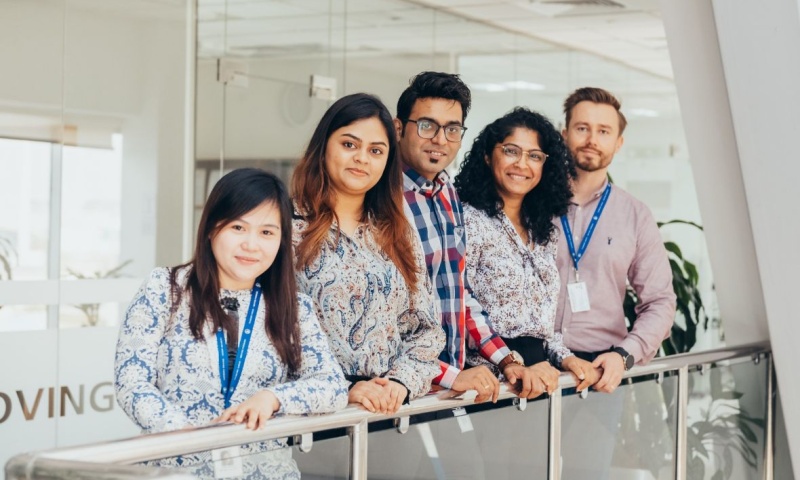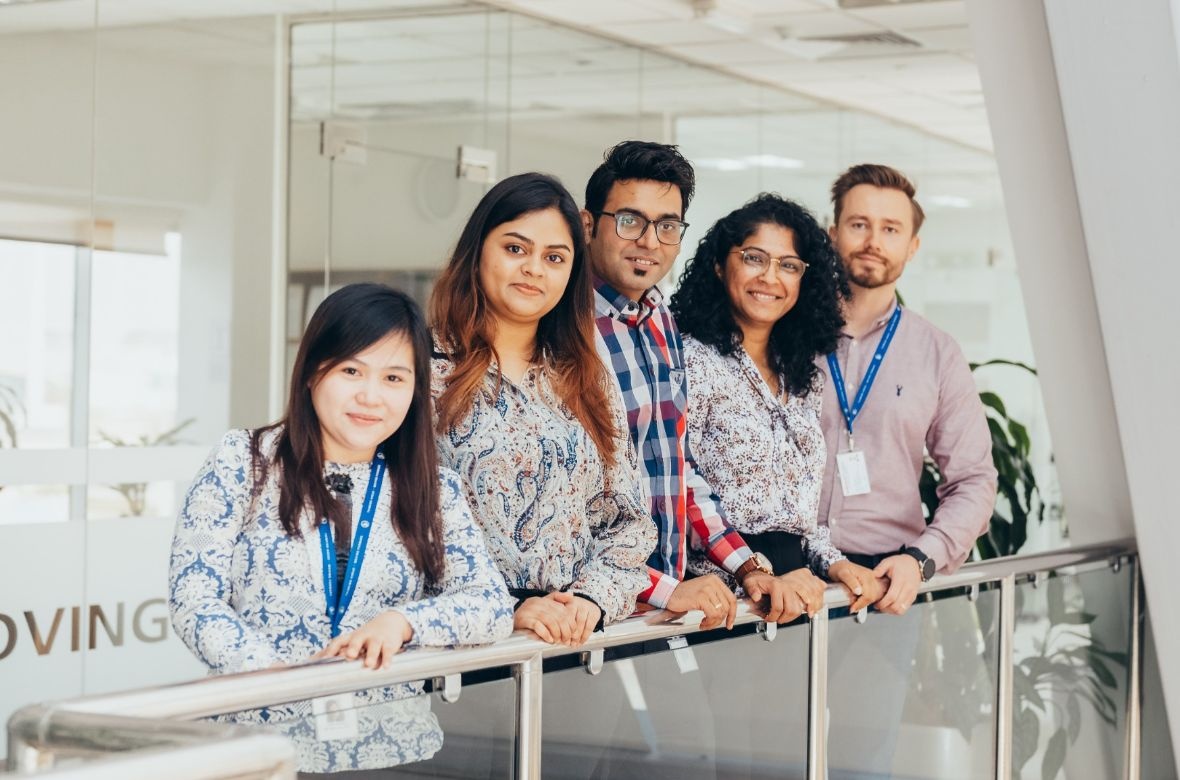
Social
Hellmann recognizes the importance of the employer-employee relationship and strives for a diverse and inclusive workforce.
Employment Relationship and Anti-Discrimination
As a family-owned company with a long tradition, where the focus is on joint action, the guiding principle: "For the better. Together." is our top priority worldwide. Behind this is the awareness that every single employee is important, because it is the employees who make Hellmann what it is: a globally successful family business. Thus, the employment relationship, i.e. the relationship between the employees and Hellmann as an employer, is more than a legal contract between two parties for the company. For this reason, the employee relationship has been identified as a key issue, along with the avoidance of discrimination. In this context, caring for each other is central, which is also reflected in our vision, mission and corporate values.
...read more
The Hellmann Promise, for example, places a special focus on the topic of caring for one another and thus manifests the Hellmann Code of Conduct, which has applied globally since 2018 and states:
”Social responsibility: Our commitment to social responsibility encompasses not only our employees but also our partners and manifests itself in two ways. The first aspect is reflected in our active efforts to improve the standard of living of all our employees through education, understanding and respect. The second aspect is demonstrated by the fact that, in order to achieve this goal, we maintain an enriching and fair workplace and have established numerous programs, including in-house training, flexible working hours for parents [as well as employees who act as caregivers, etc.] and sponsorship of charity events, so that our employees can enjoy the satisfaction of fulfilling their potential at Hellmann."
In line with this conviction, the company's stated goal is to support and develop each of its 13,949 employees worldwide with regionally different strategies, projects and approaches. Thus, the responsibility for creating the framework conditions necessary for a good employee relationship and the prevention of discrimination lies with the HR department. Managers in particular are responsible for implementing an appropriate working environment.
Hellmann also offers its employees around the world a comprehensive range of services on topics such as health care, retirement benefits, and work-life balance. At the same time, it is also important to stand up for each other in difficult times. In the reporting year, for example, a global inflation compensation premium was paid to cushion the increase in the cost of living.
In addition, the non-profit association Hellmann helps e.V. was founded. This association has set itself the goal of promoting the areas of youth and elderly welfare, education and upbringing, environmental protection and nature conservation, as well as providing assistance for those persecuted in society on political, racial or religious grounds. A further concern of the association is to help colleagues and their families worldwide quickly and directly – particularly those in need. The association is financed by donations and membership fees, and all funds flow directly into aid projects. In the reporting year, donations amounting to almost EUR 150,000 have already been collected since the association was founded in April 2022. A large part of this has already been used to support colleagues and their families affected by the war in Ukraine, for example to purchase medical supplies and power generators and deliver them to Ukraine. The association was also able to finance the life-saving operation of the child of a colleague from Sri Lanka.
In addition to these global measures, there are also numerous regional support measures and offers. In Germany, "special care leave" was expanded from four to eight special leave days per year for employees who have relatives in need of care or emergency childcare. Another local example that has received positive feedback is in South Africa: Here, expert lectures are offered every month on selected key topics, such as skin cancer, autism, HIV, etc., with a donation always being made to a non-profit organization. In addition to providing information, the aim is also to generate further support for affected families.
Hellmann South Africa was also very involved in the government's Broad-Based Black Economic Empowerment program to improve the economic participation of groups discriminated against during the apartheid regime: In 2022, a non-profit company called "Hellmann Educational NPC" (non-profit company) was established to support colleagues who are "people of color." The educational program is designed to provide targeted support for Hellmann employees and their families. The financial aid, which is explicitly earmarked for participation in educational opportunities, is therefore intended to promote economic advancement and make a contribution to society (e.g. through student loans, promotion of safety at schools, and development programs for people with disabilities).
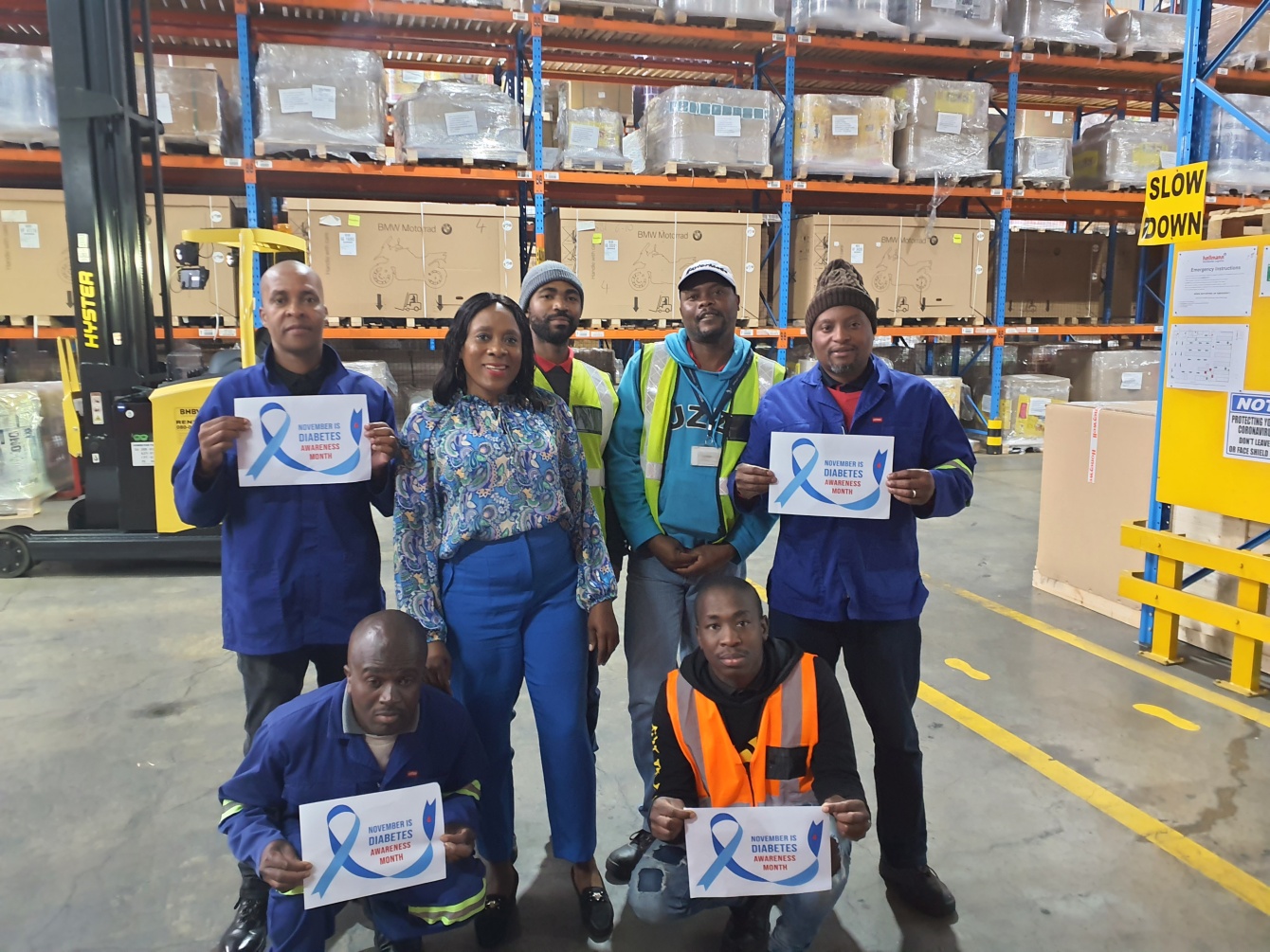
The global fluctuation rate in 2021 was 26.2 % and increased to 38.5 % in the reporting year. This increase is mainly due to a new legal requirement for the registration of temporary workers in Mexico.
In the future, the company intends to focus its employee welfare activities on the strategic development of the "work-life balance" issue and the physical and mental well-being of its employees. In this context, there is also a plan to develop an "employee wellbeing model."
In the Hellmann-Code of Conduct the topic is classified and defined as follows:
”7. Fair and equal employment.
Hellmann is committed to ensuring and promoting equal opportunities for all employees and applicants. Hellmann does not discriminate and will not tolerate discrimination (or any other form of unfair treatment) in employment opportunities or practices on the basis of race, ancestry, color, religion, sex, sexual orientation, marital status, national origin, age, disability, citizenship, veteran status, military service, or any other characteristic (all of which are considered "prohibited factors"), as this would violate human rights.
Hellmann's policies and personnel practices are designed to ensure that all Hellmann employees are treated equally, that recruitment, hiring, and promotion are conducted without regard to the prohibited factors, that employment decisions are made to promote the principle of equal employment opportunity, and that all personnel actions involving a condition or privilege of employment are conducted without regard to the prohibited factors, which are either protected by law or could be considered a violation of human rights.“
Also with regard to the Hellmann Promise, it is central for the company that this Code of Conduct is globally binding for all employees. To ensure this, it is explicitly trained as part of onboarding, for example, and measures have been drawn up to take effect if behavior deviates from the code. The aim is to ensure an open and reliable working environment in which questions, doubts and concerns can be raised without fear of retaliation. In this context, there is a globally available whistleblower hotline that can be used to report violations of policies, values and laws – anonymously if necessary. This is also explicitly referred to during the onboarding process, as is our commitment to respecting human rights.
Beyond the global requirements on anti-discrimination, however, there are also regional differences, resulting, among other factors, from different legal requirements: For example, there is more mandatory training on the topic in the United States than in other countries. In South Africa, there is an Employment Equity Committee that works to integrate people with disabilities into the workplace. As part of this initiative, 20 African women with disabilities started training at Hellmann in South Africa in the reporting year.
In general, it can be summarized that a successful anti-discrimination policy has already been established in the company, so that diversity and inclusion are lived day-to-day in the workplace at Hellmann. The next step is to continue and further develop the topics of "anti-discrimination" and "diversity and equal opportunities" as a common theme under the umbrella topic of "Diversity, Equity and Inclusion" – also with regard to the company’s strategic orientation and its corporate culture.

Frauke Bleich, Specialist HR Organization Development:
”Hellmann is a traditional global company. For us, a culture of recognition and appreciation of diversity is a prerequisite for our employees to be able to actively contribute their different perspectives, experiences and skills. This is the basis for meeting the diverse needs of our customers and business partners. We are convinced of this and it determines our actions. At the same time, we want this corporate culture to help us offer our colleagues a good working atmosphere in the long term and thus keep staff turnover as low as possible in the future.“
Diversity and equal opportunities
As an international company with employees from 143 nations and 39.5 % women, Hellmann is characterized by a very diverse workforce with a variety of different skills and characteristics. However, the company cannot and does not want to rest on its laurels: With the focus on the further essential topic of diversity and equal opportunity, the framework conditions are therefore to be strengthened so that diversity is given even more priority and value. The aim is for all employees to feel included so that they can contribute their own experiences and backgrounds in a constructive way.
...read more
Fundamentally, "Diversity & Inclusion” (D&I) culture" at Hellmann is based on the Learning approach motto: “Where are blind spots, where can a more inclusive approach be taken?” Diversity refers to the diversity of employees, and inclusion refers to the possibility of perceiving, incorporating and valuing this diversity. The overall goal is to establish a culture in which the desire and will to learn and develop is greater than the fear of failure. In order to bring together different perspectives and goals into the company, the topic of diversity was discussed in the various functional areas and countries as part of the strategic corporate alignment and then defined as a strategic goal by the Management Board. To anchor this regionally, it is essential that regional "Employee Resource Groups" discuss definitions and measures locally and implement them accordingly.
At the strategic level, Hellmann has decided to focus initially on two areas in the active implementation of its D&I culture. On the one hand, Hellmann has set itself the goal of promoting gender diversity. Specifically, the aim is to significantly increase the proportion of women/non-male individuals in management positions, as this is still considered low in some regions and areas. The overriding goal is to increase the proportion of women in top management (levels 1-3*) at Hellmann to 30 % overall (across all 3 levels combined) by 2027.
Gender distribution at the top 3 management levels at Hellmann (as of Dec. 31, 2022):
* Management level 1: Managing Board, 2: International Executive Board, 3: Direct reporting line to the level 1 & 2 with leadership responsibility
| Management Level | Female Managers | Male Managers | Total | % Female |
|---|---|---|---|---|
| 1 | 0 | 3 | 3 | 0 |
| 2 | 1 | 12 | 13 | 8 |
| 3 | 24 | 117 | 142 | 17 |
| Total | 26 | 132 | 158 | 16 |
To achieve more diversity at management levels, the framework conditions are crucial. For this reason, the company also pursues the clearly defined goal of analyzing pay equality between men and women and correcting it where necessary. This is an essential element of equal opportunity between the sexes. Likewise, even more flexible and different working models, such as job-sharing offers, exchange programs, workation, workflex, etc., are to be established in order to meet individual needs. This also includes the global standardization of mobile working models wherever possible. This not only leads to a better work-life balance, but also helps reduce C02 emissions at the same time by reducing commuting to the office, etc. As an additional central step, the plan is to deepen the knowledge of all managers and employees on the subject of diversity through special training, e.g. on the subject of "reflecting on unconscious prejudices" and through the creation of a global female talent network.
Secondly, the diversity of cultures – particularly at senior management levels – is to be promoted, i.e. the proportion of managers with different cultural backgrounds will be increased. The goal is to increase or maintain the proportion of diverse nationalities in top management (levels 1-2*) at Hellmann to 30 % per level by 2027.
Distribution of nationalities at the top 2 management levels at Hellmann (as of Dec. 31, 2022):
* Management level 1: Managing Board, 2: International Executive Board
| Menagment Level | German | Other Nationalities | % Other Nationalities |
|---|---|---|---|
| 1 | 2 | 1 | 33 |
| 2 | 12 | 1 | 8 |
| Total | 14 | 2 | 13 |
To achieve this goal, it is important to sensitize employees to the opportunities associated with diversity. To this end, various intercultural training courses are to be developed and established, and an exchange program for employees is to be introduced. A lighthouse project in this area is the Global Finance Talent Program, which was launched in 2022: The aim here is to be able to fill the increasing demand for colleagues in the finance area from within the company's own ranks. To this end, the company has defined an international two-year development program that supports young talent through targeted training and the creation of a community within the group of participants. Twelve employees from nine different countries are currently taking part in the program.
All these measures are to be implemented in 2023. In some regions and product areas, the targets have already been achieved. For more transparency and to measure progress in the area, a management dashboard has been created that shows the number, age and gender of Hellmann employees in the respective regions and functions on a daily basis.
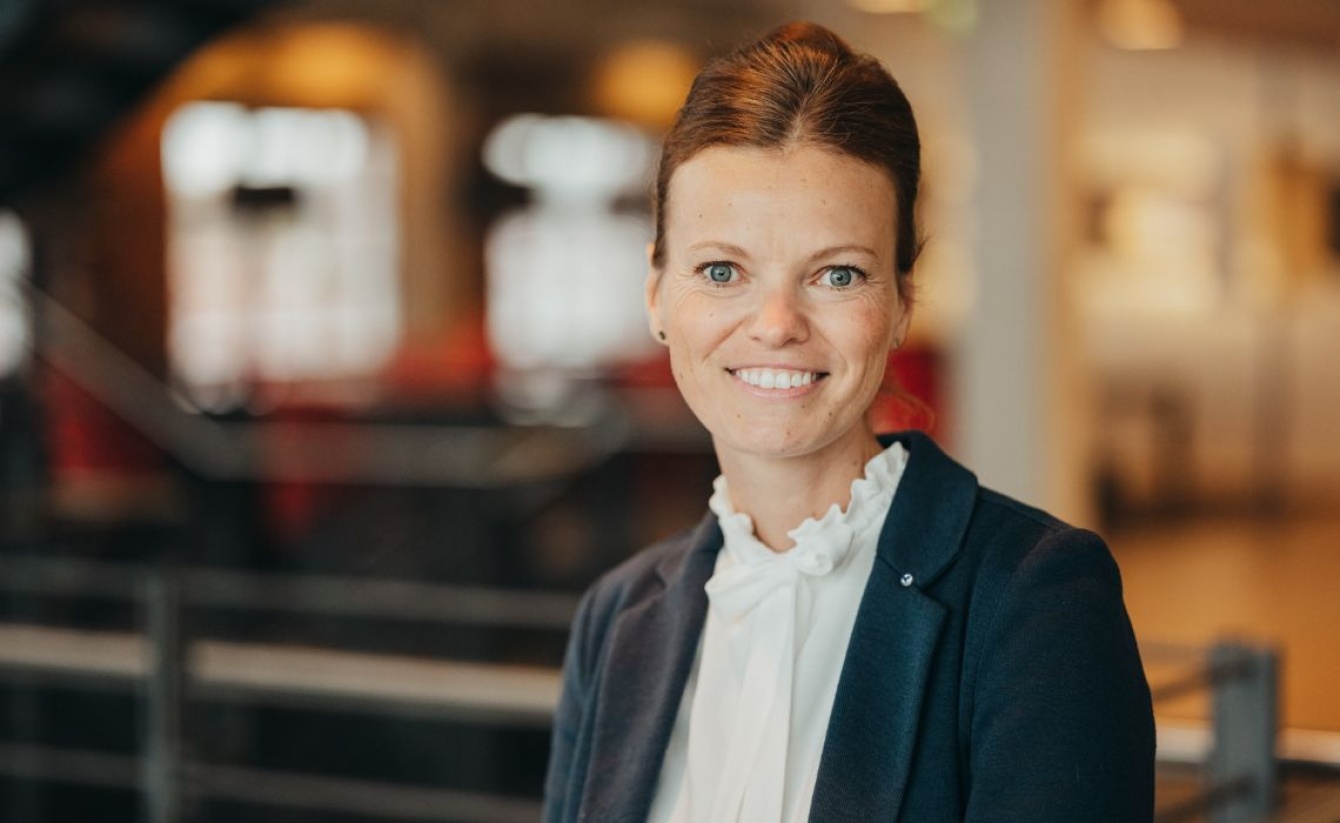
Friederike Prasuhn, Chief People Officer:
“For us as a global company, the guiding principle ’Diversity is a given, inclusion is a choice‘ applies. That's why it's so important that our managers identify with the topic of diversity and inclusion, so they can talk about it openly on the one hand and simultaneously act as role models. In addition to the numerical targets, the most important thing is that all employees feel comfortable in the company. This can best be achieved if the diversity of employees is also reflected at all management levels. Our aim is to ensure that equal opportunities are lived and experienced by everyone – for everyone.“
Occupational Safety and Health Protection
We have always taken responsibility for protecting the health and promoting the health resources of our employees worldwide. Occupational health and safety is a key issue at Hellmann simply because the company employs people, particularly in the commercial sector, but also in the commercial area, who are exposed to occupational health and safety risks due to their work, e.g. through the use of floor conveyor technology, the physical handling of goods and the physical work involved in loading and unloading.
read more...
Minimizing these risks and creating and providing an adequate working environment is a key concern for the company and is therefore also firmly established in the integrated management system, which is validated by ISO 45001 certification. An example of the minimization of work-related risks is the procurement of state-of-the-art material handling equipment in order to integrate new and innovative safety systems into operational processes. The company's health management system also offers numerous training courses for industrial employees on proper lifting and carrying or the use of exoskeletons to minimize the stress caused by physical work. In implementing ISO 45001, the focus of certification is on the corporate headquarters in Osnabrueck (Germany), as this is where the management and development of Hellmann's entire occupational health and safety system takes place. In addition, further individual certifications have been implemented in individual countries. For example, the Johannesburg site in South Africa was separately certified to ISO 45001 in the reporting year.
In the reporting year 2022, a total of 354 occupational accidents were documented. The highest number of accidents occurred in the Americas and Europe. This can be explained by the comparatively high number of employees in these two regions.
| Region | No. of Accidents 2022 |
|---|---|
| ARAC | 75 |
| AMCS | 114 |
| IMEA | 23 |
| WEUR | 144 |
| EEUR* | 1 |
| TOTAL | 354 |
* Due to the effects of the war in Ukraine, data from Eastern Europe were only available to a limited extent
The basic aim of occupational safety is to prevent accidents from the outset. Therefore, potential danger spots are minimized and workplaces are designed as safely as possible. Thus, in addition to minimizing accidents, one of the company’s goals is also to reduce downtime. Within the framework of the legal requirements, corresponding regular training courses and basic instructions are carried out. Occupational health and safety are thus central aspects of internal auditing and are checked at least once a year as part of this process. Occupational health and safety continue to be integrated into the management system and are supervised and controlled by the company's QHSE officers. In particular, this involves the assessment and classification of risks, which are generally carried out on a decentralized basis in order to incorporate local aspects and conditions into the assessment. The focus is on meeting all legal requirements, which can vary greatly from region to region and locally due to the company’s global positioning. For this reason, Hellmann defined the creation of an internal minimum standard back in 2014 and codified it in its QHSE policy. This policy is available to all employees on the intranet and on various notice boards. In many areas, however, the minimum standards have already been significantly exceeded in order to offer employees a high level of protection and to ensure safety.
Hellmann's commitment to employee health also goes far beyond the legal requirements: In the company’s largest national organization, in Germany, where it has more than 4,800 workers, it has employed a health manager since 2014, who has established a systematic occupation health management system. Additionally, there are a variety of global approaches to sustainably promote the health of colleagues.
The focus is equally on mental and physical health, and in addition to preventive sports and relaxation programs, counseling and coaching are also offered for employees and their families. Health checks and mental training are also globally established instruments for preventively promoting employee health and shaping a generally applicable health policy within the company.
Hellmann also benefited from its health management in 2022, a year still heavily influenced by the COVID pandemic. For example, health rates in Germany were kept stable at 95.1 % in the commercial area and actually increased slightly year-on-year to 90.2 % in the industrial area.
Occupational health and safety will continue to play an important role at Hellmann in the future, as they are vital for the company. The aim is therefore to continuously improve the system and raise standards wherever possible.
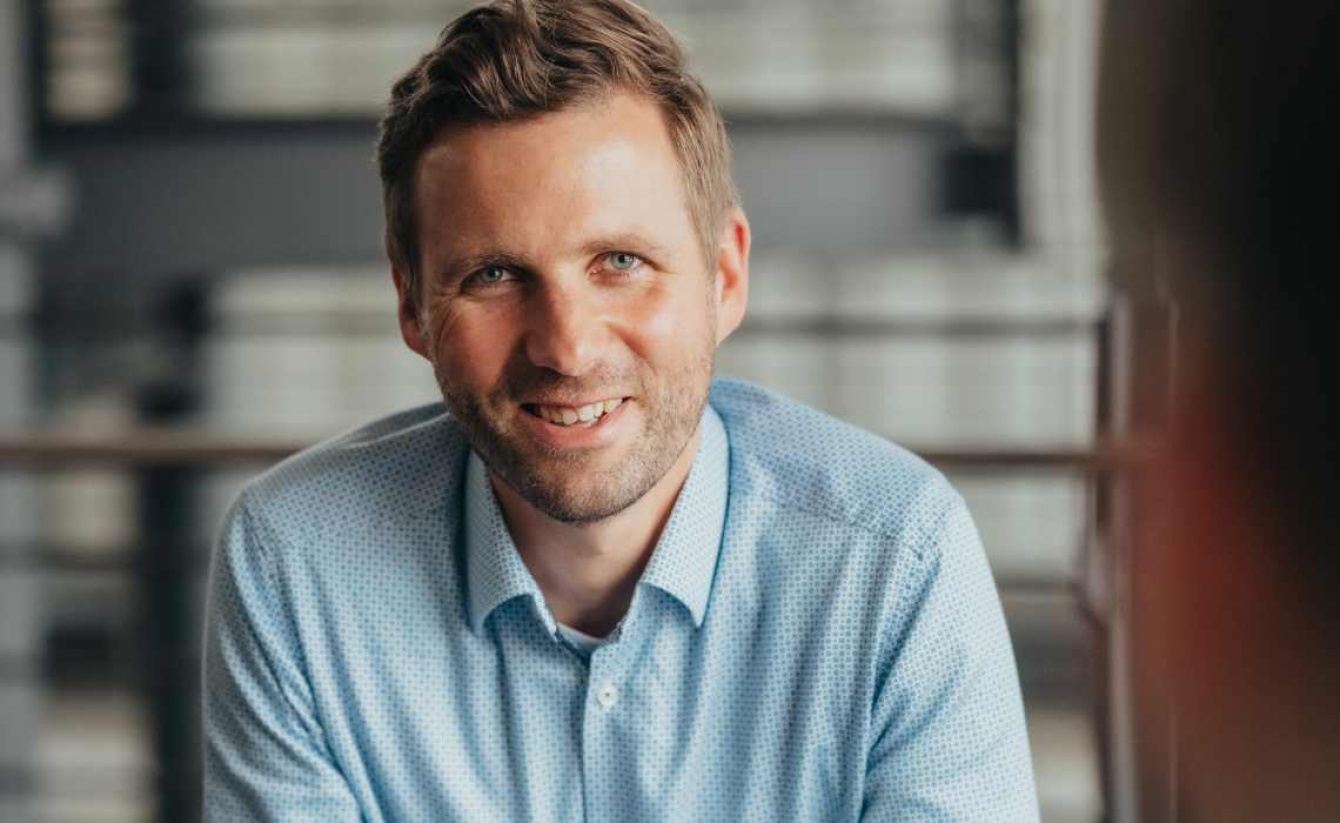
Adam Pietzka, Health Manager, Germany:
“Hellmann has very high standards for occupational health and safety, because we know that our colleagues are our most valuable resource. It is therefore important to us that employees feel good at work, because satisfied, motivated employees also lead to better work results due to less absenteeism and a positive working atmosphere. In addition to physical health, physical and social well-being also play a central role in health protection. That's why we take a holistic approach to the issue and offer a wide range of different measures and initiatives around the world – from seminars on employee and health-oriented leadership, to offers for mental recovery and resilience, and participatory exercise initiatives, as well as social and nutritional counseling, ergonomic training, and even vaccination offers.”









